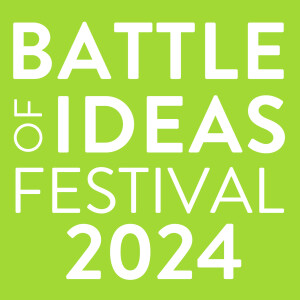
Tuesday Jan 21, 2025
Are cultural boycotts killing artistic freedom?
Recorded at the Battle of Ideas festival 2024 on Saturday 19 October at Church House, Westminster.
ORIGINAL INTRODUCTION
Boycotting as a political strategy is fashionable again, and this time round the arts are centre stage. This year a slew of campaigns supported by authors, musicians and artists have targeted festivals, galleries and theatres. Bands Boycott Barclays encouraged a third of performers to quit Brighton’s Great Escape festival while Fossil Free Books organised author boycotts of the Hay Literary Festival to oust investment-management firm Baillie Gifford. The ramifications – including financial costs to organisers and artists – have been significant. Both these high-profile sponsors subsequently suspending support for festivals and others are considering their future involvement.
Some recent boycotts have been specifically focused on opposition to the war in Gaza. Calls from Queers for Palestine and Boycott, Divestment, Sanctions (BDS) to boycott Eurovision 2024 due to inclusion of Israel led to ugly protests in Malmö. Some UK cinemas refused to screen Eurovision and venues that persisted with plans faced a backlash, including the iconic LGBT venue, the Royal Vauxhall Tavern. One worry is that boycotts fuel wider anti-Jewish prejudice. A leading agent claims ‘much of literary London is now a no-go zone for Jews’, while a survey by Artists Against Antisemitism UK reveals less awareness in the cultural industries of anti-Semitism than other forms of racism. Moreover, pro-Palestine artists have also been on the receiving end. For example, the Royal Academy removed works from its Young Artists’ Summer Show after an open letter from the Board of Deputies of British Jews.
On ditching Baillie Gifford, Hay’s chief executive, Julie Finch, said that the priority is ‘our audience and our artists’. Above all else, she added, ‘we must preserve the freedom of our stages and spaces for open debate and discussion, where audiences can hear a range of perspectives’. Elsewhere, some boycotters have resisted attacks on artists. Home Theatre in Manchester and Bristol’s Arnolfini arts centre backed out of hosting events featuring Palestinian artists or speakers, before u-turning or apologising after sustained pressure from campaigners.
Yet given that boycotts and the resultant loss of sponsorship money appears more likely to significantly limit opportunities for artists to show, speak to and debate their work, can we really say they’re likely to work in artists’ favour? Indeed, one danger is that art becomes but a footnote to the political battles. And notably a tit-for-tat mentality has developed, for example encouraging the demand that ‘If you care about Gaza, Boycott Glastonbury’ and elsewhere that anti-Zionist artists should lose funding due to accusations of anti-Semitism. Some worry that we risk normalising censorship, as in Berlin, where artists receiving public funding must now contractually commit not to express some views deemed abhorrent.
Are boycotts best understood as artists and audiences exercising a freedom to act politically, or actions that undermine artistic freedom? Do boycotts amount to simply another form of virtue-signalling, or an admirable way of standing up for one’s beliefs? Why do those artists and festival organisers with little sympathy with campaigners’ causes seem unable to stand up for artistic freedom? Can artistic freedom survive an era of cultural boycotts?
SPEAKERS
Professor Aaqil Ahmed
director, Amplify Consulting Ltd; professor of media, University of Bolton; former head of religion, Channel 4 and BBC
Jonny Best
arts producer; festival director; musician
Denise Fahmy
director, Freedom in the Arts
Josh Howie
comedian; writer and star, Josh Howie’s Losing It, BBC Radio 4; actor, Hapless; columnist, Jewish Chronicle
Liat Rosenthal
head of creative programme, Woolwich Works
CHAIR
Dr Tiffany Jenkins
writer and broadcaster; author, Strangers and Intimates (forthcoming) and Keeping Their Marbles
No comments yet. Be the first to say something!